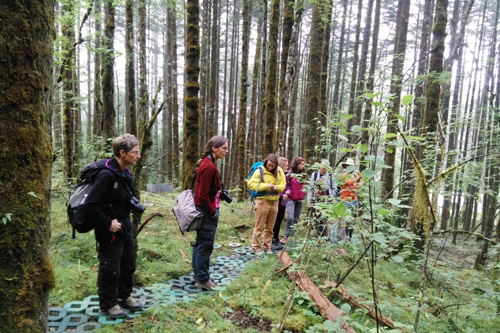A delegation composed of researchers from Bergen University and Gongga Mt. Station jointly completed scientific expedition in biological sample plots of vertical zone in the east slope of Gongga Mountain from August 19 to 28, 2015. The expedition is part of China-Norway International TransPlant Project “The response and adaptation of the key ecosystem function of mountain forest belt to climate change”.
During ten-day expedition, both sides organized training for ecological instrument application, field investigation and statistical analysis. Meanwhile, researchers completed collecting biocenosis sample in four gradient between 3000 and 4100 meters, measuring and statistical analyzing the plant community functional traits parameter, process monitoring the carbon flux of typical alpine plant community, and calibrating the temperature response curve of photosynthesis of plant.

Delegation visited Subalpine Ecosystem Observation Station (3000 m) of Gongga Mt. Station. (By IMHE)
Besides, the delegation visited Subalpine Ecosystem Observation Station (3000 m) of Gongga Mt. Station, and the vegetation evolution plots of forest plots in Gongga Mountain Station and glacial retreating plots in Hailuogou.
China-Norway International TransPlant Project “The response and adaptation of the key ecosystem function of mountain forest belt to climate change” is one of subproject of CAS International Partnership Project forInnovative Team Program “Mountain Surface Processes and Environmental Impact in the upper reaches of Yangtze River”. TransPlant Project focus on the high mountain ecosystem vertical zonation of the east slope of Gongga Mountain, passing comparative analysis to high mountain ecosystem in high latitude area of Norway, taking long-term contrast monitoring ways and the combination of field investigation and control experiment, aiming to learn the characterization of plant community structure and distribution pattern of mountain forest under current climatic conditions, and clarify the future evolution trend and response to climate change.
